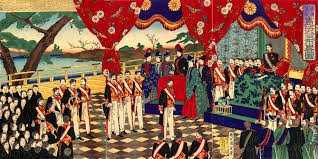Exploring the Roots of Cantonese in Hong Kong
Objective:
Students will gain an understanding of the historical development of Cantonese in Hong Kong, including its linguistic origins, sociopolitical influences, and contemporary significance.
I. Introduction
Background information on Hong Kong, and Cantonese:
Hong Kong is a special administrative region (SAR) of the People's Republic of China. comprises 200 islands located in Eastern Asia bordering the South China Sea and China
Cantonese is a language originating from the city of Guangzhou (historically known as Canton) and its surrounding Pearl River Delta. It is the traditional Prestige variety of the Yue Chinese group, which has over 82.4 million native speakers. While the term Cantonese specifically refers to the prestige variety, it is often used to refer to the entire Yue subgroup of Chinese. Cantonese is viewed as a vital and inseparable part of the cultural identity of its native speakers across large swaths of southern China, Hong Kong, and Macau, as well as in overseas communities. Although Cantonese shares much vocabulary with Mandarin and other varieties of Chinese, these Sinitic languages are not mutually intelligible, largely because of phonological differences, but also due to the differences in grammar and vocabulary.
Chinese and English are the official languages of Hong Kong. English is widely used in the Government and by the legal, professional, and business sectors. Trilingual professionals who speak English, Cantonese, and Putonghua play a vital role in the numerous enterprises trading in Hong Kong or doing business with mainland China and Taiwan.
The proportion of the population aged 5 and over by usual spoken language:
- Cantonese: 88.2%
- Putonghua: 2.3%
- Other Chinese dialect: 2.8%
- English: 4.6%
- Other language: 2.1%
Engage students with a brief discussion about their familiarity with Cantonese and its importance in Hong Kong.
- Have you heard Cantonese being spoken before? If so, where and in what context?
- How is Cantonese different from other Chinese dialects or languages?
- In your opinion, why do you think Cantonese is an essential part of Hong Kong?
- What role do you think Cantonese might play in Hong Kong's future, considering ongoing social and political changes?
II. Historical Roots of Cantonese
- Present a timeline of Cantonese language development, highlighting key events such as:
- Ancient origins in the Yue Chinese family. https://www.mychinaroots.com/blog/surnames/yu-family-history/
- Influence of the Tang and Song dynasties https://www.frontiercsd.org/cms/lib/NY19000265/Centricity/Domain/167/Tang%20and%20Song.pdf
- Migration patterns to Guangdong province and later to Hong Kong.
- Show maps illustrating the geographic spread of Cantonese-speaking regions.
III. Cantonese in Colonial Hong Kong
- Discuss the impact of British colonial rule on the linguistic landscape of Hong Kong.
- Explore how Cantonese thrived as the dominant language despite colonial influences.
- Introduce prominent figures and cultural artifacts that contributed to the preservation and development of Cantonese during this period.
IV. Post-Handover Challenges and Adaptations
- Examine the changes in language policy and attitudes toward Cantonese after Hong Kong's return to China.
- Discuss the role of Mandarin and English in education, media, and daily life, and their effects on Cantonese usage.
- Highlight efforts by activists and organizations to promote and preserve Cantonese in the face of linguistic shifts.
V. Contemporary Significance and Future Prospects
- Explore the role of Cantonese in modern Hong Kong society, including its presence in media, pop culture, and everyday interactions.
- Discuss the challenges and opportunities for Cantonese language preservation in the digital age.
- Encourage students to reflect on the importance of preserving Cantonese as part of Hong Kong's cultural heritage.
VI. Conclusion and Reflection
- Summarize the key points covered in the lesson.
- Invite students to share their thoughts, questions, or personal experiences related to Cantonese language and culture.
Language resources(cantonese): https://cantonese-alliance.github.io/language.html





Post a comment Cancel reply